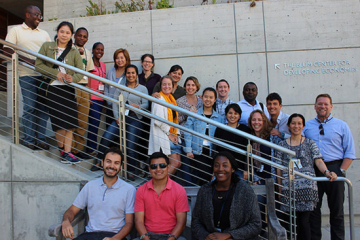During the comprehensive two-week session, participants will learn to use economics to be more strategic and successful in their work, and experience a transformational shift in how they view environmental issues. The course covers economic fundamentals, natural resource economics, valuation of ecosystem services, environmental policies, communication and negotiation techniques, and hands-on experience with cost-benefit analysis of projects and policies. These skills are crucial at a time when global-scale environmental changes are being driven by a diversity of economic factors, and when conservation leaders are striving to harness opportunities to reward the preservation of ecosystem services.
Economic Tools for Conservation 2016

July 25 - August 5 2016
The Blum Center
2 week program
The total cost for the two-week program is $5000 per participant.
Associate Professor/UHERO Research Fellow
Department of Economics, University of Hawai'i at Manoa
Senior Lecturer
Department of Economics, University of Wisconsin — Madison
Training Director
Conservation Strategy Fund
What's Included:
- Instruction by economic experts
- CSF course facilitators and residential staff
- All course materials and supplies
- Exclusive access to CSF online workspace with course reading and materials
- 13 nights lodging in residential housing on the UC Berkeley campus
- All meals and coffee breaks during the course
- Field trips
- Travel health insurance, if not provided by employer
- Lifetime membership in CSF's global Alumni Network
Who should attend
This course is for people at the forefront of conservation challenges, including managers of conservation programs and protected areas, directors of non-governmental organizations, and representatives of government agencies. Applicants from a variety of disciplines such as biology, forestry, law, anthropology, or economics are encouraged to apply. Previous training in economics is beneficial, but not essential. Applicants must be proficient in spoken and written English.
Year after year, participants give CSF’s Economic Tools for Conservation course highest marks in terms of content, instructors, staff and the overall course experience. Our courses also create significant and lasting impacts. Alumni report that:
The course influenced how I approach my conservation work – 95%
The training was one of the most useful short courses I have attended – 92%
I continue to benefit from my CSF training – 90%
Agenda
- An essential foundation in basic economic concepts and languages
- Skills to evaluate the costs and benefits of natural resource management and development decisions, including values of ecosystem services
- Insight into the drivers of environmental problems, including market and institutional failures
- The ability to formulate more effective strategies and policies for conservation
- Invaluable practice using communication and negotiation techniques to articulate environmental values in a language that communities, businesses, and governments can understand
- A close network with fellow conservation professionals through the unique CSF Residence Program on the Berkeley Campus
Please see the Conservation Strategy Fund's page for more information.



